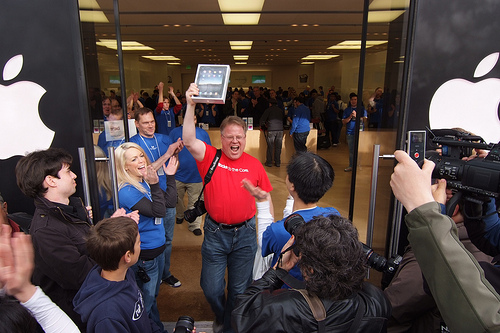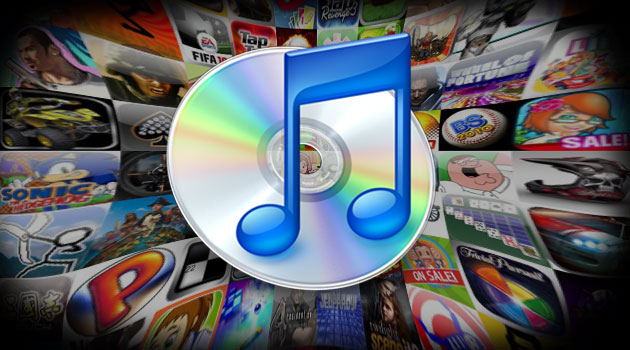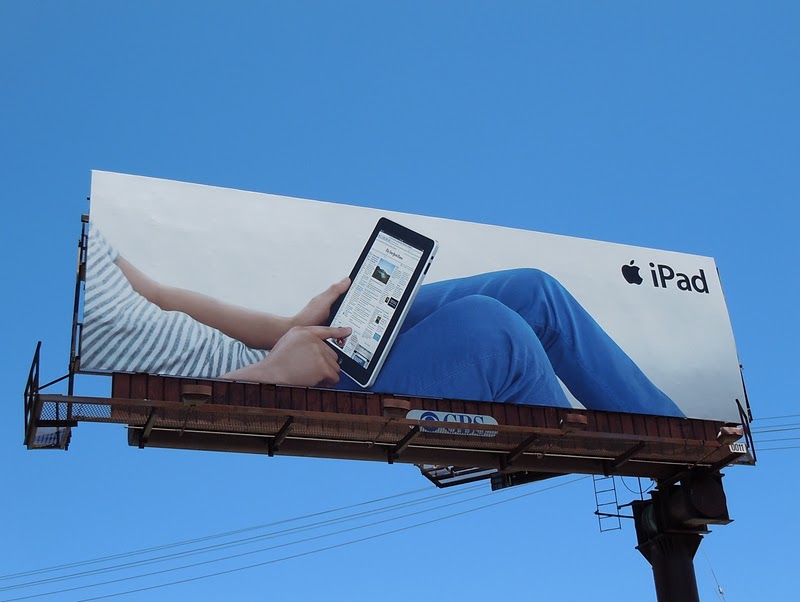Whatever you may think of the iPad – whether you believe it to be the savior of old media or simply “a big iPod Touch” – there is one thing that cannot be denied: the thing has been a massive success.
By last count, Apple had sold 3.27 million of them in the last quarter and, if that rate is anything to go by, sales are now probably over 4 million. The tablet computer, it seems, has arrived.
Naturally then, Apple’s competitors are gearing up their own versions. This, for better or worse, is the state of our industry: Apple innovates and others then play catch-up. Research in Motion, makers of the Blackberry, are widely expected to release a ‘Blackpad‘. Microsoft are expected to clarify their approach to tablets in the next few months. And there are some upcoming Android tablets that look promising.
Trouble is, no-one’s sure how well these will fare, mainly because it so often feels like Apple’s competitors, well, ‘don’t get it‘. This is something that has happened before too, with the iPod and, until recent versions of Android, the iPhone.
But the market is a much better place when there are valid competitors. Now that Android and RIM are going toe-to-toe with Apple, all consumers in the smartphone market benefit.
So, in the spirit of healthy competition, here are five tips for challenging the iPad. It won’t be easy. But then, nothing worth doing ever is.
1. It’s the Ecosystem, Stupid
Challengers to Apple’s throne often like to trumpet how they beat the iGang in one area: there is more software available on Windows; Android is available with or without a keyboard; this MP3 player sounds better than the iPod.
None of that matters.
Why? Apple’s popularity comes from the fact their software, hardware and services work ‘holistically’ – i.e. the whole thing works together seamlessly. A lot of people like to dismiss this as ‘a closed ecosystem’. And maybe that’s true. But whether it is or not, it means that it isn’t simply the device that works well, but the entire experience of everything connected to the device. So any challenger must work on not only hardware, but the services and infrastructure behind it.
As as result, some kind of content distribution network is crucial. You cannot, for example, play ‘Digital Copy’ files from DVDs on an Android device. That may not be a big deal, but it’s a symbol of something larger. Apple offers simple, neat content solutions that are easy and compelling, and this is half the reason for their success. The point is, either compete on all fronts by presenting an integrated solution, or don’t compete at all. Those are your options.
What’s more, closed is not the not only way to build a functioning ecosystem. Look to ePub ebooks for an example – embracing a standard allows far more players to participate and results in a better experience for end-users. Open standards are possible and it will be just the ticket to challenge the iTunes/iOS world.
Lesson 1: Competing in tablets is about more than just the tablet itself; it’s about the universe of services and software behind it.
2. Go Where Apple Won’t or Can’t
If you are anything like most tech-savvy people, your computer’s hard drive is full of video files. It’s likely that some of them are DivX, some of them MKVs and many of them the various types of MP4s. If you’re lucky, some of those may play on your iPad without any conversion. But most of them won’t. This represents an opportunity.
What is key to building to a true iPad competitor is doing things that Apple either can’t or won’t. Apple refuses to support the wide variety of video formats, whether because it might hurt their content relationships or because they only trust particular formats. Any competitor must support that. Android is pretty good for this. A lot of devices allow you to simply throw MP4s or other files on there. But rather than requiring specific file formats, codecs or resolutions, an iPad competitor should handle all the things Apple won’t touch with aplomb.
This extends beyond video too. Support as many file formats as possible. (After all, supporting MP3s did nothing to damage the iPod. Instead, it became a selling point.) But more than that, beat Apple to the punch. Set up deals for magazine subscriptions before iTunes. Establish a cloud-based media service that makes accessing movies and music from anywhere easy. Yes, it’s a big investment, but it’s only way to beat Apple at their own game.
Lesson 2: Fill in the gaps left by Apple’s insistence on being closed.
3. Forget Desks; Embrace the Couch and The Kitchen Table
A tablet is not a large smartphone. It is not a netbook or a laptop replacement. It is a tablet.
Here’s why that’s important. Tablets are frames for content. They are not devices to create spreadsheets with. They are not for writing novels or books. They are primarily for consuming content. They are, to put in another way, devices to be used on the couch and at the kitchen table. These are devices that occupy the same functions once held by magazines, portable game consoles, TVs near the dining table and books by the bedside.
As a result, tablets need to be equally proficient at movies, music, books, the web and any mixture of those things. What Apple’s competitors must understand is that the slate computer is, well, a blank slate, that must be able to morph into a number of things: book; TV screen; gaming console; photo album.
But more importantly, it has to be engaging to use. It has to be aesthetically appealing. To wit: it must be its own thing, not a replacement for something else. You are trying to create a new experience, not digitally replicate one from the past.
Lesson 3: The tablet is a new class of device. Treat it as such.
4. Tablets Require a Tablet OS
Related to Lesson 1, but it needs saying: tablets require an OS built from the ground up for touch. It’s difficult not to cringe when we hear Steve Ballmer saying that Microsoft expects tablets to be running Windows.
Um, Steve? No.
Windows is brilliant for desktops and laptops. But even an optimized version is still too resource-heavy and power-hungry for a tablet. You need a custom OS. It’s actually Google, rather than Microsoft, who are on the right track with Android: it is designed for touch control, is light and adaptable and already supports an app store.
Lesson 4: Do not ‘downport’ another OS. Build one around touch, portability, battery-life and media.
5. Brand it Like You Mean It
When Sony made their half-hearted attempts to go after the iPod, they came up with brilliant names like “Sony Walkman NW-HD5”. Catchy, right? Ugh.
Every successful tech launch in the decade has been about a specific brand. Kindle. Android. Blackberry. Wii. And the recent success of the Motorola Droid shows that people are willing to respond to competitor brands that are positioned quite differently from Apple.
But more than that, a company looking to enter this new tablet market must think about how it intends to position itself as part of the contemporary moment. Simply playing catch-up won’t be enough to gain critical mass. Through marketing, you have to be able to market the ability of your tablet to participate in the modern world, whether through cloud media services, new magazine subscription models, or something else.. That means selling what you can do with the tablet, not simply how it’s ‘a better value than the iPad’.
Lesson 5: Convincing people to want one is more than about tech, or even a catchy name – it’s about selling what a tablet allows you to do.






I really liked your blog. Really Great
I really wish anyone coming out with one of these would drop the “pad” name. Everyone made fun of it when Apple first announced it.
Very well written blog. Very true, too. I especially like very last line. Until Apple miraculously dies off, I don’t think they’re going to have true competition in markets like this (unfortunately).
Great post, but aren’t you afra-a-a-a-aid of the iStapo? 😀
As soon as I read ‘Apple innovates and the others play catch-up’ I stopped reading. The Ipad is not innovation, its super-sizing. IOS4 is not innovation, its catching up with HTC and Google’s Evo. The original iphone was the last true innovation Apple has introduced.
Very true, totally agree with you.
It seems like most people from Toronto this fellow doesnt get it. To concerne with being hip and promoting self image to truly understand.
It’s the Ecosystem, Stupid
No it’s not, having a closed ecosystem cuts you off from other brands…other brands you my have loyalty to or a preference for. Embracing a closed architecture means walling off your consumers from other products they may have and may not have the desire or cash to change for compatibility with your closed architecture
Go Where Apple Won’t or Can’t
Well it least he got 1 out of 5 right
Forget Desks; Embrace the Couch and The Kitchen Table
While allowing for something to be easy small enough to carry is a good idea having something you have to hold to watch or listen to is not. Do people hold up their tvs to watch a movie or tv show no nor would they use these devices if they had to. People dont even like holding up a smart phone for say the 45 min it takes to watch a tv show (without commercials). And watching it while it sits flat for say a movie is likely to cause neck strain.
Also if you had to carry your smartphone or mp3 player around while listening to your music instead of being able to put it into your pocket you might be a little more likely to find an alternative.
Tablets Require a Tablet OS
Wrong again limiting the functionality of any device to the “fisher price kiddieness” (forgive the improvised term) of the ios as found on apples devices will regulate them to be interim solutions until you can get to a real computer (read laptop or desktop) or tv. While these devices will have limited usefullness (afterall no one would expect you to type long work emails or say edit a video project on these things on a regular basis) they should be as close to a real computer as you can make it . People will want seamless transfer of their interaction with these types of devices as possible. Look at the way we are synchronizing our personal world across the electronic devices we interact with on a daily basis. Limiting the functionality so that you have to take a “step down” in functionality when stepping away from your laptop or desktop is a reversal in the trend mobile devices are becoming more and more capable, it has been the trend so far and it will continue into the future. hobbling your capability when you become mobile maybe a good idea to steve jobs but to the rest of us we want progress.
Brand it Like You Mean It
Most of the people I know who arent apple fanboys make fun of the apple fanboys for the way they conspicuously display their apple logo (some trying to appear nonchallant some going all out rabid fanboy) any before you mac heads chime in no…it isnt jealousy. Its one of the most irritating things about mac fans. Any other brand which tried to brand your whole out look and way of life as aggressively as apple would be equally as worthy or ridicule.
The tablet isnt a revolution in computing or even a user experience, it’s failed before and it will again. The only reason it has sold so much so far, is good advertising…that’s what apple excels at – hype and creating a false sense of superiority.
So there’s your lesson boys and girls if you want to beat apples ipad in the short time the tablet fad is here, just hire better spin doctors and push out better hype and make your customers feel they are better smarter and cooler than everyone else (especially apple fans) by owning your tablet.
“You cannot, for example, play ‘Digital Copy’ files from DVDs on an Android device.”
Android users know how to rip DVDs
“Related to Lesson 1, but it needs saying: tablets require an OS built from the ground up for touch. It’s difficult not to cringe when we hear Steve Ballmer saying that Microsoft expects tablets to be running Windows.
Um, Steve? No.”
Um, yes. As a tablet PC owner. I’d rather have a full OS.”You cannot, for example, play ‘Digital Copy’ files from DVDs on an Android device.”
Android users know how to rip DVDs
“Related to Lesson 1, but it needs saying: tablets require an OS built from the ground up for touch. It’s difficult not to cringe when we hear Steve Ballmer saying that Microsoft expects tablets to be running Windows.
Um, Steve? No.”
Um, yes. As a tablet PC owner. I’d rather have a full OS.”You cannot, for example, play ‘Digital Copy’ files from DVDs on an Android device.”
Android users know how to rip DVDs
“Related to Lesson 1, but it needs saying: tablets require an OS built from the ground up for touch. It’s difficult not to cringe when we hear Steve Ballmer saying that Microsoft expects tablets to be running Windows.
Um, Steve? No.”
Um, yes. As a tablet PC owner. I’d rather have a full OS.”You cannot, for example, play ‘Digital Copy’ files from DVDs on an Android device.”
Android users know how to rip DVDs
“Related to Lesson 1, but it needs saying: tablets require an OS built from the ground up for touch. It’s difficult not to cringe when we hear Steve Ballmer saying that Microsoft expects tablets to be running Windows.
Um, Steve? No.”
Um, yes. As a tablet PC owner. I’d rather have a full OS.”You cannot, for example, play ‘Digital Copy’ files from DVDs on an Android device.”
Android users know how to rip DVDs
“Related to Lesson 1, but it needs saying: tablets require an OS built from the ground up for touch. It’s difficult not to cringe when we hear Steve Ballmer saying that Microsoft expects tablets to be running Windows.
Um, Steve? No.”
Um, yes. As a tablet PC owner. I’d rather have a full OS. Windows 7 works great, much better than Apple’s
That’s odd…
@techni
The full featured tablet PC has been out in various form for years. It was a complete failure on all points. Most people, besides yourself, don’t want that and voted with their wallet. There may be scenarios where a full PC tablet makes sense and perhaps you fall in to that but you are in the minority. Also I don’t agree that all android users know how to rip DVD’s. Sure, readers of tech blog that have an android device may be a little more tech knowledgeable but a very large part of android users are average people who wanted an iPhone like phone but cant or aren’t willing to deal with AT&T.
Nice points – and I think you missed one more critical one….Connectivity. In attempting to use the iPad as a travel companion, I ran into major wi-fi difficulties, inability to connect to a wired ethernet port (still quite dominant in Europe), and the inability to effectively move data into or out of the device. Using iTunes as the only connectivity portal is a major, major fail….the opportunity is defintely out there to do one better…and I say that being pretty much an apple-fan-boy.
Window is “brilliant” for desktops and laptops? What the what!?
Someone pointed out your writeup after I had written and released a day earlier my latest thoughts:
“The Rise, Rise and RISE of Apple”
http://mastercobbler.blogspot.com/2010/07/rise-rise-and-rise-of-apple.html
#1 is key. #3 is as well – in my missive I call this “consumption at your fingertips”.
Regards,
-M
Companies do need to focus on these things. I have a mac and love it, but competition bring innovation.
Not EVERY Android owner knows how to rip DVDs or even wants to. If that’s the basis of your argument that you presented god knows how many times, you already failed
Here’s the problem with step 2.
No one’s going to be able to do it. Even Apple and Amazon have tremendous difficulty in getting content providers to get onboard. Microsoft suffers with it too.
Streaming cloud based music of your own collection hasn’t happened yet because of licensing fees. Is there going to be some great big company to make all the record companies change their mind? I doubt it.
MKV’s aren’t secure, no content provider will touch it. We all want open, but no one will adapt it and sign up content delivery services that will be open. Same for magazines. Kindle’s got stuff, and content providers, what do they do? Screw early adopters over with price gouging to the point where they tell all their friends it’s not worth it… to stick to RSS readers and Instapaper-style readers.
You want to take Apple down on that note? They’ve already got the building blocks in place obviously to move from closed content to open content. They’re doing it now with iTunes Plus songs.
Pay walls for content will fall at some point I’m sure, whether its news, music, or television. But simply being there to pick up Apple’s pieces isn’t enough and it’s not the right move to make when no one wants to play with anyone but Google, Apple, and Microsoft, and even then, they play really dirty.
Point #4 is pretty much the reason why there was never a successful tablet market before the iPad. Companies kept shoehorning Windows onto their devices, then wondering why their product failed. They kept redesigning their hardware instead of addressing the underlying problem.
The iPhone and iPad have been successes because Apple actually made the touchscreen experience engaging. Next to no learning curve, natural and intuitive that anyone from 2-99 years can easily grasp how it work.
My thoughts exactly.
awesome apple fanboy blog post and even better fanboy followers. Think Different!
Support Flash. Now you have the entire web at your finger tips, something that iPad doesn’t have.
THIS is the single most difficult thing to get people to understand, and why I have yet to see a competitor that seems worth getting:
[A tablet is not a large smartphone. It is not a netbook or a laptop replacement. It is a tablet.]
I’m amazed. I expected this to be yet another “apple sucks” or “yay ipad!” list. Instead it’s actually rather informative and actually fairly logical in it’s suggestions.
Different indeed.
I need to clarify that competition will give rise to better quality and better products. What we should know is the major difference between each gadget that are available. Tablet is different and computer is different.